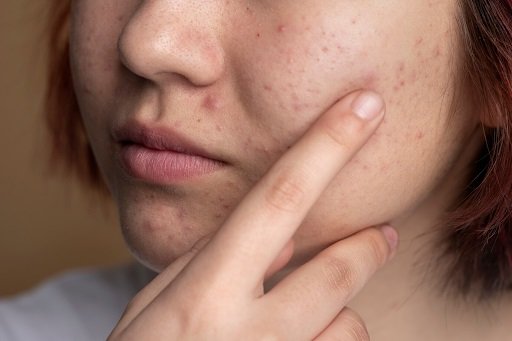Acne scars, the lasting aftermath of severe acne, are persistent textural changes and indentations on the skin. These scars develop as a result of inflamed blemishes caused by skin pores filled with excess oil, dead skin cells, and bacteria. In the process, the pore swells, leading to a break in the follicle wall, which eventually heals, leaving behind a scar. However, the good news is that there are various treatments and procedures available to minimize the appearance of these scars.
Diverse Forms of Acne Scars
Acne scars manifest in several forms, each with unique characteristics. Ice pick scars are small, deep holes, while boxcar scars have sharp edges and flat bottoms. Rolling scars are broader depressions with sloping edges, and keloid scars are raised, thickened scars. Understanding the type of scars to help with the kind of acne scar treatment in Malaysia is crucial for determining the most effective treatment approach.
General Tips for Acne Scars Reduction
Healthy Diet and Hydration:
A nutritious, balanced diet plays a crucial role in maintaining overall health, including skin health. Meals rich in vegetables, fruits, lean proteins, and whole grains, coupled with adequate water intake, support immunity, mental health, energy levels, and vitality. These factors contribute to the body’s natural healing processes.
Proper Face-Cleaning Routines:
Maintaining a consistent face-cleaning routine is essential for promoting skin health. This includes daily washing, twice-weekly exfoliation, toning, moisturizing, and removing makeup before bedtime. Allowing pores to breathe is vital for skin regeneration.
Avoiding Sun Exposure:
Sun exposure can exacerbate skin damage, leading to issues such as sunburn, premature ageing, and even skin cancer. Protective measures, such as wearing appropriate clothing, applying sunscreen with sufficient SPF, and limiting outdoor activities during peak sunlight hours, are crucial for preserving healthy skin.
Possible Risks and Precautions
Skin Sensitivity Reactions:
Skin sensitivity reactions may occur due to irritants or allergens, leading to symptoms like rashes, hives, burning, or itching. Identifying and avoiding potential triggers, such as certain chemicals, fragrances, or foods, is important in preventing adverse reactions.
Allergies:
Allergic reactions, characterized by hypersensitive immune responses to allergens, can manifest as sneezing, itching, or rashes. Being aware of potential allergens and taking appropriate precautions, such as avoiding exposure or seeking medical advice, is essential.
Safe Experimentation with Natural Treatments:
While natural treatments can be beneficial, it’s crucial to conduct safe experimentation. Thorough research or consultation with healthcare professionals is advisable to understand potential interactions, side effects, and individual health conditions.

Importance of Maintaining a Skincare Routine
Consistency in Using Natural Remedies:
The benefits of natural remedies are maximized with consistent use over time. Regular application allows the body to adjust gradually, promoting overall well-being and health.
Daily Skin Protection:
A daily skincare routine, including cleansing, moisturizing, sun protection, and periodic exfoliation, is vital for maintaining healthy and youthful skin. These measures help prevent skin damage and premature ageing, and reduce the risk of skin cancer.
Consultation with a Dermatologist
When to Consult a Dermatologist:
Seeking professional advice is crucial if there are sudden changes in the skin, such as severe acne, unexplained rashes, or alterations in moles’ size or colour. Persistent itching that doesn’t resolve also warrants dermatological consultation. Regular skin screenings are recommended for early detection of potential skin cancer signs.
Follow-Up Treatment Options:
Follow-up treatment options are tailored strategies to ensure continuity of care. These may include physical therapy, regular check-ups, additional surgeries, or medications to promote recovery, prevent complications, and monitor for potential recurrence.
In conclusion, understanding acne scars and adopting a holistic approach to skincare can significantly contribute to minimizing their impact and maintaining healthy skin. Regular consultation with a dermatologist and following a personalized skincare routine are integral components of effective scar management

